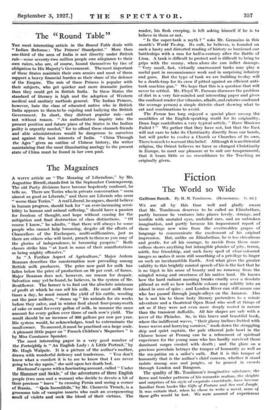The Magazines
A wrrry article on " The Meaning of Liberalism," by Mr. Augustine Birrell, stands first in the September Contemporary. The old Party divisions have become hopelessly confused, he tells us. There are Tories who in private conversation " seem almost as good as Liberals," and there are Liberals who seem " worse than Tories." A real Liberal, he argues, should believe in human progress, should look for " an ever-increasing sensi- bility to human and animal suffering," should have a passion for freedom of thought, and hope without ceasing for the mitigation and final destruction of class distinctions. " Of course I know," he admits, " that there will always be some people who cannot help becoming, despite all the efforts of Chancellors of the Exchequer, multi-millionaires, just as there are others who will insist, preach to them as you may of the glories of independence, in becoming paupers." Both classes strike him " at least in some of their manifestations as being mighty offensive."
In " A Fordian Aspect of Agriculture," Major Ardern Beaman describes the consternation now prevailing among British milk producers. The price now paid for milk has fallen below the price of production on 90 per cent. of farms. Major Beaman does not, however, see reason for despair. Salvation may yet be found, he believes, in the system of Mr. Boutflower. The farmer is to find out the absolute minimum of profit at which he can sell his milk. He must milk three times a day, he must record the yield of his cattle, weeding out the poor milkers, " steam up " his animals for six weeks before they calve, and in winter feed about four-pennyworth of cake or meal for every gallon of milk, in summer the same amount for every gallon over three of each cow's yield. The result should be an increase of 300 gallons per cow per year. His system would, he acknowledges, tend to exterminate the small owner. To succeed, it must be practised on a large scale. A pleasant little paper on " French Children's Magazines is by Miss Constance Spender.
The most interesting paper in a very good number of the Fortnightly is " An English Lady : A Little Portrait," by Mr. Hugh Walpole. It is a picture of the author's mother, drawn with wonderful delicacy and tenderness. " You don't know what a comfort it is to me to know that I am never going to be shy again," she said upon her death bed.
Blackwood's opens with a fascinating account, called " Under the Hammer and Sickle," of the adventures of three English people (two men and a woman) who decide to devote a bit of their precious " leave " to crossing Persia and seeing a corner of Russia. " Quirt Incredibile," by Mr. Chenevix Trench, is a gruesome tale of vampire insects who emit an overpowering smell of violets and suck the blood of their victims. The
reader, his flesh creeping, is left asking himself if lie is to believe in them or not.
" Is the super-tank a myth ? " asks Mr. Germains in this month's World To-day. Its cult, he believes, is founded on such a hasty and distorted reading of history as burdened our battleships with a ram for half-a-century after the Battle of Lissa. A tank is difficult to protect and is difficult to bring to grips with the enemy, when alone she can inflict damage. " Very small, fast, virtually unarmoured tanks may play a useful part in reconnaissance work and in surprising infantry and guns. But the type of tank we are building to-day will be a death-trap for its crew if pitted against an efficient anti- tank machine gun." We hope that this is a question that will never be settled. Mr. Floyd W. Parsons discusses the problem of diet in a very fair-minded and interesting paper and gives the confused reader (for vitamins, alkalis, and calories confound the average person) a simple dietetic chart showing what to eat and combinations to avoid.
The Forum has long enjoyed a special place among the monthlies of the English-speaking world for its originality. Dean Inge contributes a very typical article, " Have Missions Failed ? " We gather that they have not, but that the East will not care to take its Christianity directly from our hands, but will prefer to evolve a Church or Churches of its own. There is much to warrant this belief. Although it is an Oriental religion, the Orient believes we have so changed Christianity in Europe, to meet our pleasure or to suit our temperament, that it bears little or no resemblance to the Teaching as originally given.










































 Previous page
Previous page